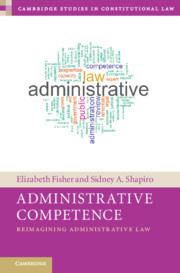Book contents
- Administrative Competence
- Cambridge Studies in Constitutional Law
- Administrative Competence
- Copyright page
- Dedication
- Contents
- Abbreviations
- Acknowledgments
- 1 The State We Are In
- Part I Making Administrative Competence Visible
- Part II Confronting the Origin Myths of Administrative Law
- 4 Enlightened Foundations
- 5 Debating Administrative Competence
- 6 The Emergence of Administrative Law and the Limits of Legal Imagination
- 7 The Narrowing of the Administrative Law Imagination
- Part III The Law of Public Administration
- Bibliography
- Index
4 - Enlightened Foundations
from Part II - Confronting the Origin Myths of Administrative Law
Published online by Cambridge University Press: 02 October 2020
- Administrative Competence
- Cambridge Studies in Constitutional Law
- Administrative Competence
- Copyright page
- Dedication
- Contents
- Abbreviations
- Acknowledgments
- 1 The State We Are In
- Part I Making Administrative Competence Visible
- Part II Confronting the Origin Myths of Administrative Law
- 4 Enlightened Foundations
- 5 Debating Administrative Competence
- 6 The Emergence of Administrative Law and the Limits of Legal Imagination
- 7 The Narrowing of the Administrative Law Imagination
- Part III The Law of Public Administration
- Bibliography
- Index
Summary
When the legal historian William Novak states, “the United States is distinctly a ‘legal or jural state,’”1 what does this mean? One very simple understanding is that the Constitution and the legal concepts contained in it are the supreme law of the land. Richard Epstein’s argument for the “classic liberal constitution” that “prized the protection of liberty and private property under a system of limited government”2 is one example of this. Phillip Hamburger’s framing of American government through legal concepts such as adjudication and legislation is another.3
- Type
- Chapter
- Information
- Administrative CompetenceReimagining Administrative Law, pp. 105 - 127Publisher: Cambridge University PressPrint publication year: 2020

